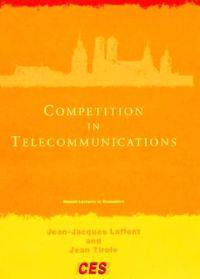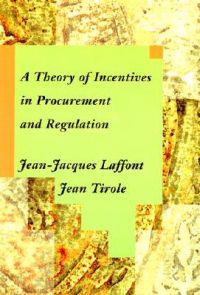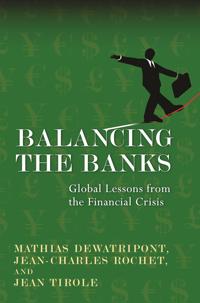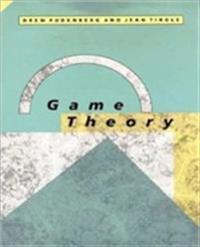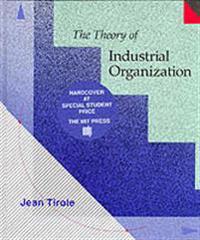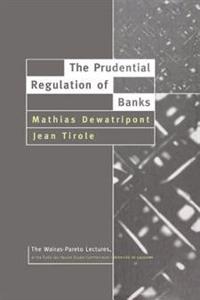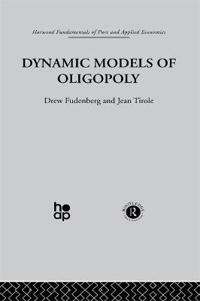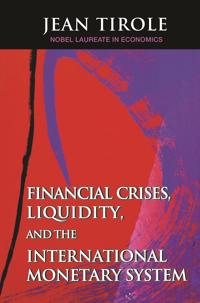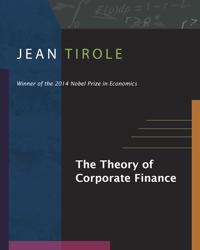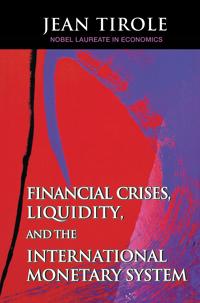Competition in Telecommunications (Pocket)
avJean-Jacques Laffont, Jean Tirole, Jean-Jacques Laffont
ISBN: 9780262621502 - UTGIVEN: 2001-03Theoretical models based on the assumption that telecommunications is a natural monopoly no longer reflect reality. As a result, policymakers often lack the guidance of economic theorists. Competition in Telecommunications is written in a style accessible to managers, consultants, government officia[...]
A Theory of Incentives in Procurement and Regulation (Inbunden)
avJean-Jacques Laffont, Jean Tirole
ISBN: 9780262121743 - UTGIVEN: 199304More then just a textbook, A Theory of Incentives in Procurement and Regulation will guide economists' research on regulation for years to come. It makes a difficult and large literature of the new regulatory economics accessible to the average graduate student, while offering insights into the theo[...]
Balancing the Banks (Inbunden)
avMathias Dewatripont, Jean-Charles Rochet, Jean Tirole
ISBN: 9780691145235 - UTGIVEN: 201004The financial crisis that began in 2007 in the United States swept the world, producing substantial bank failures and forcing unprecedented state aid for the crippled global financial system. Bringing together three leading financial economists to provide an international perspective, "Balancing the[...]
Inside and Outside Liquidity (Inbunden)
avBengt Holmstrom, Jean Tirole, Bengt Holmstrom
ISBN: 9780262015783 - UTGIVEN: 2011-01Why do financial institutions, industrial companies, and households hold low-yielding money balances, Treasury bills, and other liquid assets? When and to what extent can the state and international financial markets make up for a shortage of liquid assets, allowing agents to save and share risk mor[...]
Game Theory (Inbunden)
avDrew Fudenberg, Jean Tirole
ISBN: 9780262061414 - UTGIVEN: 199110This advanced text introduces the principles of noncooperative game theory - including strategic form games, Nash equilibria, subgame perfection, repeated games, and games of incomplete information - in a direct and uncomplicated style that will acquaint students with the broad spectrum of the field[...]
The Theory of Industrial Organization (Inbunden)
avJean Tirole
ISBN: 9780262200714 - UTGIVEN: 198801The Theory of Industrial Organization is the first primary text to treat the new industrial organization at the advanced-undergraduate and graduate level. Rigorously analytical and filled with exercises coded to indicate level of difficulty, it provides a unified and modern treatment of the field wi[...]
The Prudential Regulation of Banks (Pocket)
avMathias Dewatripont, Jean Tirole, Mathias Dewatripont
ISBN: 9780262513869 - UTGIVEN: 1994-12The Prudential Regulation of Banks applies modern economic theory to prudential regulation of financial intermediaries. Dewatripont and Tirole tackle the key problem of providing the right incentives to management in banks by looking at how external intervention by claimholders (holders of equity or[...]
Inside and Outside Liquidity (Pocket)
avBengt Holmström, Jean Tirole
ISBN: 9780262518536 - UTGIVEN: 2013-02-15Two leading economists develop a theory explaining the demand for and supply of liquid assets.
Dynamic Models of Oligopoly (Pocket)
avDrew Fudenberg, Jean Tirole, Drew Fudenberg
ISBN: 9780415771238 - UTGIVEN: 2002-05In October 2014, Jean Tirole capped a long career by scooping the Nobel Prize for Economic Science. Tirole's long career saw him make major contributions to industrial organization, game theory and financial theory and Dynamic Models of Oligopoly, co-authored with this long term collaborator Drew Fu[...]
Financial Crises, Liquidity and the International Monetary System (Inbunden)
avJean Tirole
ISBN: 9780691099859 - UTGIVEN: 2002-07Once upon a time, economists saw capital account liberalization - the free and unrestricted flow of capital in and out of countries - as unambiguously good. Good for debtor states, good for the world economy. No longer. Spectacular banking and currency crises in recent decades - from Latin America i[...]
The Theory of Corporate Finance (Inbunden)
avJean Tirole
ISBN: 9780691125565 - UTGIVEN: 200512The past twenty years have seen great theoretical and empirical advances in the field of corporate finance. Whereas, once the subject addressed mainly the financing of corporations - equity, debt, and valuation - today it also embraces crucial issues of governance, liquidity, risk management, relati[...]
Financial Crises, Liquidity & the International Monetary Systems (Pocket)
avJean Tirole
ISBN: 9780691167046 - UTGIVEN: 2015-06Once upon a time, economists saw capital account liberalization--the free and unrestricted flow of capital in and out of countries--as unambiguously good. Good for debtor states, good for the world economy. No longer. Spectacular banking and currency crises in recent decades have shattered the conse[...]

